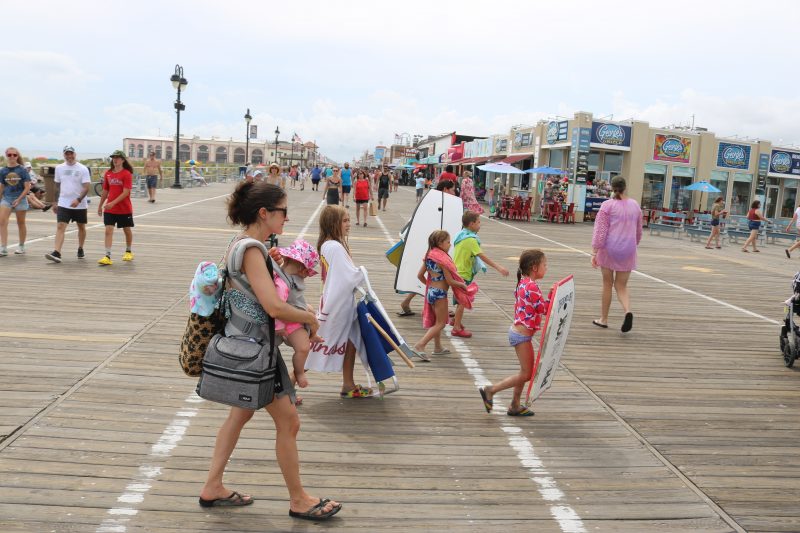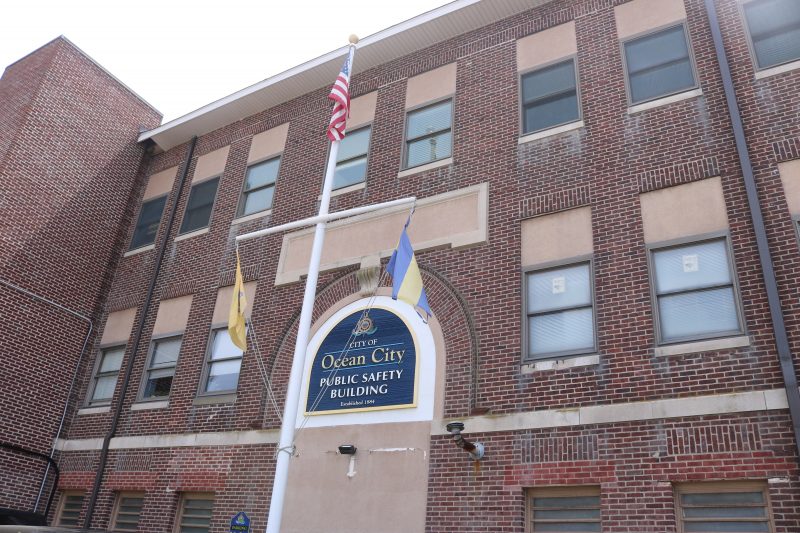Auto thefts continue in Ocean City, with the most recent one this week.
 By DONALD WITTKOWSKI and MADDY VITALE
By DONALD WITTKOWSKI and MADDY VITALE
This summer in Ocean City, the beach will serve as a vast buffer to protect the Boardwalk. Not from storms, but from rowdy teenagers.
Ocean City plans to continue with its strategy of keeping large groups of teens out on the beaches at night under police supervision rather than having them spill onto the family-friendly Boardwalk and becoming a nuisance.
Broadly sketching out the police department’s plans for the summer, Police Chief Jay Prettyman stressed in an interview Friday that the same basic strategy was successful in 2021 and 2022, so there was really no reason for a dramatic overhaul this year.
Police keep an eye on the crowds of teens while they are hanging out on the beach at night to break up any fights, stop them from drinking alcohol or otherwise getting into trouble, Prettyman said.
“The kids are on the beach. They are actually in the most-supervised area we have,” he said. “We give them an area and we monitor it.”
Prettyman pointed out that by keeping the teens out on the beach, they are less likely to disrupt the summertime crowds of families and other visitors on the Boardwalk.
“Over the last couple of years, our real serious violations on the Boardwalk area are down. It’s a good indicator that they are being supervised,” he said.
However, Prettyman noted that he sometimes hears complaints from people about the “optics” of kids congregating on the beaches.
“Once I talk to those people and I explain what is happening, they are more appreciative that we are allowing the kids to stay on the beach so they can enjoy the Boardwalk with their family,” he said.

Groups of teenagers hang out on the 11th Street beach at night in August of 2022.
Generally speaking, allowing the teens to congregate on the beach at night rather than having them gather on the Boardwalk is “the lesser of the two evils,” he added.
“You may not like looking at them on the beach, but it is certainly more comfortable to look at them on the beach than it is to have them bumping into your baby carriage or listening to their music or foul language or zigzagging through them on the Boardwalk,” Prettyman said.
Previously, the police would kick groups of teens off the beach at night. The relatively new strategy of allowing them to stay on the beach to hang out there instead of causing trouble on the Boardwalk “is working,” Prettyman said.
“We have way less issues now than we did when we kicked them off the beach and sent them to the Boardwalk,” he noted.
The police department has a total of 62 officers assigned to the Boardwalk – a captain, two sergeants, eight patrolmen and women and about 50 seasonal officers. During each shift, as many as 31 officers are patrolling the Boardwalk. The busy weekend nights require the biggest number of officers per shift, Prettyman said.
“We have a pretty large force assigned just to the Boardwalk, and that gives us the ability to keep an eye on the kids and keep them moving along,” he said. “Other towns don’t have the size of our seasonal force.”
In past years, it was customary for police officers to effectively blend in with the crowds – almost invisibly – while patrolling the Boardwalk. Prettyman explained that Boardwalk merchants and other people now prefer to see a heavier police presence to serve as a deterrent for rowdy behavior.
“Our Boardwalk merchants love it. I ask the Boardwalk merchants and I get their feedback, along with the officers,” he said. “They are completely in favor with everything that we are doing and they say that it is providing the best Boardwalk environment that they can have for their customers as well.”

Police are looking to preserve the family-friendly atmosphere of the Boardwalk.
Overall, most of the teenagers in Ocean City are not causing trouble on the beach or Boardwalk, Prettyman emphasized.
“The vast majority of kids are good kids who hang out with other kids to have fun,” he said.
Police have different options for dealing for troublesome teens. By far, most of them are given “curbside warnings” for minor offenses such as using foul language or riding bikes on the Boardwalk after hours. The curbside warnings effectively allow police to tell the juveniles to move along.
In 2022, Ocean City police issued 41,000 documented curbside warnings, the highest number of any municipality in New Jersey, Prettyman said.
“Sometimes, when I tell people that number, they think I’m joking,” he said.
If things escalate, police may take juveniles into custody for what is known as a “stationhouse adjustment.” Police will then call the parents or legal guardians to have them pick up their children.
“We’ve seen and gotten a lot of feedback from our supervisors that when the parents have to come and pick up their kids, they realize that their children are their responsibility and they will think twice the next time they let their kids come here unsupervised, because they are going to have to come down and pick them up or they get in trouble. Partnering with the parents is a big thing for us,” Prettyman said.
There were 467 stationhouse adjustments in Ocean City in 2022, the highest number of any town in the state, Prettyman said.
Juveniles are not arrested or given a summons for stationhouse adjustments. Usually, they have to write an essay and perform some type of community service such as cleaning up litter as punishment.

The police department issued 41,000 curbside warnings to juveniles in 2022 for minor infractions.
As another more serious step to deal with juvenile crime, City Council approved a new ordinance in January that will classify a litany of minor offenses such as underage drinking, curfew violations and littering as a “breach of the peace” to allow police to detain juveniles who allegedly break local laws.
Juveniles risk being arrested for a breach of the peace. But Prettyman noted that the ordinance will only be used in small numbers as a last resort.
Ocean City is hardly alone among towns along the Jersey Shore that have been dealing with unruly teens in the last two summers.
State laws enacted in 2021 as part of Gov. Phil Murphy’s juvenile justice reforms put restrictions on police on how far they can go in their interactions with teens. Murphy wants to avoid saddling teenagers with a criminal record that could hurt them later on when they try to enter college or begin their careers.
Elected officials and police chiefs at the shore have complained that rowdy teens have little to fear now of being arrested, which has emboldened them to commit crimes such as theft, vandalism, underage public drinking and smoking marijuana.
Prettyman believes that it is critical for the state Legislature to give police departments more power to crack down on underage drinking. When teens are intoxicated, it can easily lead to more serious crimes that police have to deal with, he said.
 By DONALD WITTKOWSKI and MADDY VITALE
This summer in Ocean City, the beach will serve as a vast buffer to protect the Boardwalk. Not from storms, but from rowdy teenagers.
Ocean City plans to continue with its strategy of keeping large groups of teens out on the beaches at night under police supervision rather than having them spill onto the family-friendly Boardwalk and becoming a nuisance.
Broadly sketching out the police department’s plans for the summer, Police Chief Jay Prettyman stressed in an interview Friday that the same basic strategy was successful in 2021 and 2022, so there was really no reason for a dramatic overhaul this year.
Police keep an eye on the crowds of teens while they are hanging out on the beach at night to break up any fights, stop them from drinking alcohol or otherwise getting into trouble, Prettyman said.
“The kids are on the beach. They are actually in the most-supervised area we have,” he said. “We give them an area and we monitor it.”
Prettyman pointed out that by keeping the teens out on the beach, they are less likely to disrupt the summertime crowds of families and other visitors on the Boardwalk.
“Over the last couple of years, our real serious violations on the Boardwalk area are down. It’s a good indicator that they are being supervised,” he said.
However, Prettyman noted that he sometimes hears complaints from people about the “optics” of kids congregating on the beaches.
“Once I talk to those people and I explain what is happening, they are more appreciative that we are allowing the kids to stay on the beach so they can enjoy the Boardwalk with their family,” he said.
By DONALD WITTKOWSKI and MADDY VITALE
This summer in Ocean City, the beach will serve as a vast buffer to protect the Boardwalk. Not from storms, but from rowdy teenagers.
Ocean City plans to continue with its strategy of keeping large groups of teens out on the beaches at night under police supervision rather than having them spill onto the family-friendly Boardwalk and becoming a nuisance.
Broadly sketching out the police department’s plans for the summer, Police Chief Jay Prettyman stressed in an interview Friday that the same basic strategy was successful in 2021 and 2022, so there was really no reason for a dramatic overhaul this year.
Police keep an eye on the crowds of teens while they are hanging out on the beach at night to break up any fights, stop them from drinking alcohol or otherwise getting into trouble, Prettyman said.
“The kids are on the beach. They are actually in the most-supervised area we have,” he said. “We give them an area and we monitor it.”
Prettyman pointed out that by keeping the teens out on the beach, they are less likely to disrupt the summertime crowds of families and other visitors on the Boardwalk.
“Over the last couple of years, our real serious violations on the Boardwalk area are down. It’s a good indicator that they are being supervised,” he said.
However, Prettyman noted that he sometimes hears complaints from people about the “optics” of kids congregating on the beaches.
“Once I talk to those people and I explain what is happening, they are more appreciative that we are allowing the kids to stay on the beach so they can enjoy the Boardwalk with their family,” he said.
 Groups of teenagers hang out on the 11th Street beach at night in August of 2022.
Generally speaking, allowing the teens to congregate on the beach at night rather than having them gather on the Boardwalk is “the lesser of the two evils,” he added.
“You may not like looking at them on the beach, but it is certainly more comfortable to look at them on the beach than it is to have them bumping into your baby carriage or listening to their music or foul language or zigzagging through them on the Boardwalk,” Prettyman said.
Previously, the police would kick groups of teens off the beach at night. The relatively new strategy of allowing them to stay on the beach to hang out there instead of causing trouble on the Boardwalk “is working,” Prettyman said.
“We have way less issues now than we did when we kicked them off the beach and sent them to the Boardwalk,” he noted.
The police department has a total of 62 officers assigned to the Boardwalk – a captain, two sergeants, eight patrolmen and women and about 50 seasonal officers. During each shift, as many as 31 officers are patrolling the Boardwalk. The busy weekend nights require the biggest number of officers per shift, Prettyman said.
“We have a pretty large force assigned just to the Boardwalk, and that gives us the ability to keep an eye on the kids and keep them moving along,” he said. “Other towns don’t have the size of our seasonal force.”
In past years, it was customary for police officers to effectively blend in with the crowds – almost invisibly – while patrolling the Boardwalk. Prettyman explained that Boardwalk merchants and other people now prefer to see a heavier police presence to serve as a deterrent for rowdy behavior.
“Our Boardwalk merchants love it. I ask the Boardwalk merchants and I get their feedback, along with the officers,” he said. “They are completely in favor with everything that we are doing and they say that it is providing the best Boardwalk environment that they can have for their customers as well.”
Groups of teenagers hang out on the 11th Street beach at night in August of 2022.
Generally speaking, allowing the teens to congregate on the beach at night rather than having them gather on the Boardwalk is “the lesser of the two evils,” he added.
“You may not like looking at them on the beach, but it is certainly more comfortable to look at them on the beach than it is to have them bumping into your baby carriage or listening to their music or foul language or zigzagging through them on the Boardwalk,” Prettyman said.
Previously, the police would kick groups of teens off the beach at night. The relatively new strategy of allowing them to stay on the beach to hang out there instead of causing trouble on the Boardwalk “is working,” Prettyman said.
“We have way less issues now than we did when we kicked them off the beach and sent them to the Boardwalk,” he noted.
The police department has a total of 62 officers assigned to the Boardwalk – a captain, two sergeants, eight patrolmen and women and about 50 seasonal officers. During each shift, as many as 31 officers are patrolling the Boardwalk. The busy weekend nights require the biggest number of officers per shift, Prettyman said.
“We have a pretty large force assigned just to the Boardwalk, and that gives us the ability to keep an eye on the kids and keep them moving along,” he said. “Other towns don’t have the size of our seasonal force.”
In past years, it was customary for police officers to effectively blend in with the crowds – almost invisibly – while patrolling the Boardwalk. Prettyman explained that Boardwalk merchants and other people now prefer to see a heavier police presence to serve as a deterrent for rowdy behavior.
“Our Boardwalk merchants love it. I ask the Boardwalk merchants and I get their feedback, along with the officers,” he said. “They are completely in favor with everything that we are doing and they say that it is providing the best Boardwalk environment that they can have for their customers as well.”
 Police are looking to preserve the family-friendly atmosphere of the Boardwalk.
Overall, most of the teenagers in Ocean City are not causing trouble on the beach or Boardwalk, Prettyman emphasized.
“The vast majority of kids are good kids who hang out with other kids to have fun,” he said.
Police have different options for dealing for troublesome teens. By far, most of them are given “curbside warnings” for minor offenses such as using foul language or riding bikes on the Boardwalk after hours. The curbside warnings effectively allow police to tell the juveniles to move along.
In 2022, Ocean City police issued 41,000 documented curbside warnings, the highest number of any municipality in New Jersey, Prettyman said.
“Sometimes, when I tell people that number, they think I’m joking,” he said.
If things escalate, police may take juveniles into custody for what is known as a “stationhouse adjustment.” Police will then call the parents or legal guardians to have them pick up their children.
“We’ve seen and gotten a lot of feedback from our supervisors that when the parents have to come and pick up their kids, they realize that their children are their responsibility and they will think twice the next time they let their kids come here unsupervised, because they are going to have to come down and pick them up or they get in trouble. Partnering with the parents is a big thing for us,” Prettyman said.
There were 467 stationhouse adjustments in Ocean City in 2022, the highest number of any town in the state, Prettyman said.
Juveniles are not arrested or given a summons for stationhouse adjustments. Usually, they have to write an essay and perform some type of community service such as cleaning up litter as punishment.
Police are looking to preserve the family-friendly atmosphere of the Boardwalk.
Overall, most of the teenagers in Ocean City are not causing trouble on the beach or Boardwalk, Prettyman emphasized.
“The vast majority of kids are good kids who hang out with other kids to have fun,” he said.
Police have different options for dealing for troublesome teens. By far, most of them are given “curbside warnings” for minor offenses such as using foul language or riding bikes on the Boardwalk after hours. The curbside warnings effectively allow police to tell the juveniles to move along.
In 2022, Ocean City police issued 41,000 documented curbside warnings, the highest number of any municipality in New Jersey, Prettyman said.
“Sometimes, when I tell people that number, they think I’m joking,” he said.
If things escalate, police may take juveniles into custody for what is known as a “stationhouse adjustment.” Police will then call the parents or legal guardians to have them pick up their children.
“We’ve seen and gotten a lot of feedback from our supervisors that when the parents have to come and pick up their kids, they realize that their children are their responsibility and they will think twice the next time they let their kids come here unsupervised, because they are going to have to come down and pick them up or they get in trouble. Partnering with the parents is a big thing for us,” Prettyman said.
There were 467 stationhouse adjustments in Ocean City in 2022, the highest number of any town in the state, Prettyman said.
Juveniles are not arrested or given a summons for stationhouse adjustments. Usually, they have to write an essay and perform some type of community service such as cleaning up litter as punishment.
 The police department issued 41,000 curbside warnings to juveniles in 2022 for minor infractions.
As another more serious step to deal with juvenile crime, City Council approved a new ordinance in January that will classify a litany of minor offenses such as underage drinking, curfew violations and littering as a “breach of the peace” to allow police to detain juveniles who allegedly break local laws.
Juveniles risk being arrested for a breach of the peace. But Prettyman noted that the ordinance will only be used in small numbers as a last resort.
Ocean City is hardly alone among towns along the Jersey Shore that have been dealing with unruly teens in the last two summers.
State laws enacted in 2021 as part of Gov. Phil Murphy’s juvenile justice reforms put restrictions on police on how far they can go in their interactions with teens. Murphy wants to avoid saddling teenagers with a criminal record that could hurt them later on when they try to enter college or begin their careers.
Elected officials and police chiefs at the shore have complained that rowdy teens have little to fear now of being arrested, which has emboldened them to commit crimes such as theft, vandalism, underage public drinking and smoking marijuana.
Prettyman believes that it is critical for the state Legislature to give police departments more power to crack down on underage drinking. When teens are intoxicated, it can easily lead to more serious crimes that police have to deal with, he said.
The police department issued 41,000 curbside warnings to juveniles in 2022 for minor infractions.
As another more serious step to deal with juvenile crime, City Council approved a new ordinance in January that will classify a litany of minor offenses such as underage drinking, curfew violations and littering as a “breach of the peace” to allow police to detain juveniles who allegedly break local laws.
Juveniles risk being arrested for a breach of the peace. But Prettyman noted that the ordinance will only be used in small numbers as a last resort.
Ocean City is hardly alone among towns along the Jersey Shore that have been dealing with unruly teens in the last two summers.
State laws enacted in 2021 as part of Gov. Phil Murphy’s juvenile justice reforms put restrictions on police on how far they can go in their interactions with teens. Murphy wants to avoid saddling teenagers with a criminal record that could hurt them later on when they try to enter college or begin their careers.
Elected officials and police chiefs at the shore have complained that rowdy teens have little to fear now of being arrested, which has emboldened them to commit crimes such as theft, vandalism, underage public drinking and smoking marijuana.
Prettyman believes that it is critical for the state Legislature to give police departments more power to crack down on underage drinking. When teens are intoxicated, it can easily lead to more serious crimes that police have to deal with, he said.